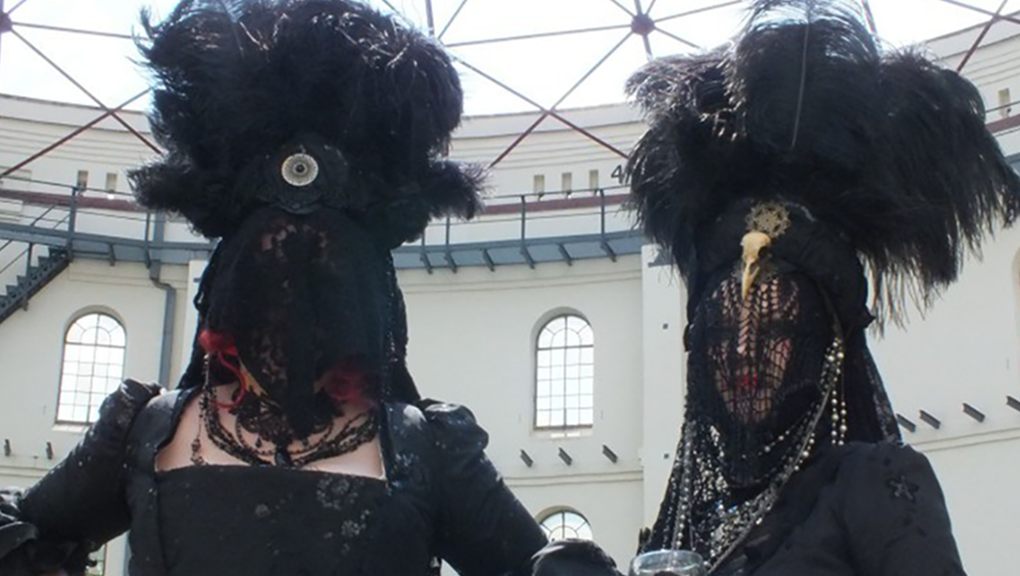“The two great themes are love and the fear of the loss of love, even if it never ended.” – Cusch Jung, Director
From the moment one walks into Leipzig’s Musikalische Komödie (MuKo), the mood is set with crashing waves and a thundering drum roll for The Count of Monte Cristo. Based on the novel by Alexandre Dumas, the musical premiered in St. Gallen, Switzerland, in 2009. It was penned by American composers Frank Wildhorn and Jack Murphy.
The dynamic musical production at MuKo is helmed by director Cusch Jung and musical director Tobias Engeli.

It succeeds at retaining the essence of the timeless literary classic, adhering faithfully to its themes of betrayal, injustice, revenge, transformation, and of course, love.
The Count of Monte Cristo is bookended in time between 1815-1838. It takes us from Marseilles and Leghorn, to the Island of Monte Cristo, to Rome, Paris and finally Versailles. The plot is shrouded by events involving Napoleon, and the constant struggle engaging him and his supporters (Bonapartists) against the royalists.
Our man, Edmond Dantès, is only 19 when the merchant ship he is serving on puts down anchor in Marseilles.
Dantès has everything – love, looks, a promising future.
That is, until he is framed as a Bonapartist traitor by three men for varying self-serving reasons. As sung by the prosecutor Villefort, “naive and harmless” Dantès is arrested on his wedding day and sent to the historical hell of the isolated Chateau d’If for 14 years.
In such a place, one can truly wallow in despair. But Edmond has luck on his side as he meets a longtime prisoner – the Abbé Faria – in the next cell. While they endeavor to steadily dig themselves out of the prison, Faria gives Edmond an education befitting an aristocrat of the time. Edmond learns from him everything from philosophy and literature to elocution and sword-fighting, so as to be fit to effectively wreak his revenge upon those who did him wrong.
The Abbé also tells him about the vast treasure hidden on the Island of Monte Cristo. Upon his eventual escape, Edmond retrieves it with the help of the formidable and shrewd pirate queen, Louisa Vampa, and her shipmates. He then goes about reinventing himself as the mysterious and affluent Count of Monte Cristo.

In the MuKo production, Marc Clear is completely convincing as Edmond Dantès. He moves fluidly from the innocent Edmond, full of youthful energy and enthusiastic love for his Mercédès; to the tortured prisoner yearning for revenge; to the older, wiser, vengeful Count.
One of the absolute highlights of the musical is Clear’s rousing, passionate and powerful rendition of “Hell to Your Doorstep.”
As his ladylove, Marysol Ximénez-Carrillo – clad in a series of stunning yet understated frocks, thanks to the costuming of Sven Bindseil – is a picture of beauty and suffering. She portrays Mercédès with subtle eloquence, and a voice full of heartfelt clarity and expressiveness.
Mercédès is lied to and basically tricked into marrying the creepifying Fernando Mondego, played deliciously dishonourable by Andreas Rainer.
I must admit involuntarily shuddering whenever Rainer and Ximénez-Carrillo had scenes.
One scene that especially stands out has the stage split between Edmond in prison and a distraught Mercédès at home, as his best friend, Fernando, “comforts” her by continually petting her head. His cohorts in the crime against Edmond, Gerard de Villefort (the corrupt judge) and Danglars (the corrupt businessman) are played respectively evilly by Milko Milev and (on that night) Hinrich Horn.
All three particularly stand out in the two fabulous duets, the duplicitous “A Story Told” and the ode to greed “Too Much is Never Enough.”
I’d like to make special mention of three other players.
First, Sabine Töpfer is all fire and grace as Louisa Vampa, with an appropriately robust voice to match, especially in the rousing “Pirates (Truth or Dare)”. And then there’s the director of the musical, Cusch Jung, who practically stole the show from the moment he appeared on stage, with his brief yet brilliant performance as the Abbé Faria. It was both comedic and poignant at once.
I found Tom Bergmann’s portrayal of pirate-turned-faithful manservant to the count, Jacopo, also a standout in that he didn’t… stand out, as any good manservant should. He was just always there, cutting a dashing figure of competent calm.
Last but not least, I would like to highlight Laura Scherwitzl as Valentine de Villefort, daughter of the judge and paramour of Mercédès and Mondego’s son, Albert – played winsomely by Jeffery Krueger. Valentine is caught up in the middle of everything, between people she loves, amid all of the parties involved in Dante’s misfortune.

Despite all of this, she summons up the courage to act. Valentine’s ballad, “Pretty Lies,” is all about growing up believing one thing and then realizing that nothing was as it seemed, and everything everyone ever told you was untrue. It’s a coming-of-age ballad about being angry and confused, and Scherwitzl sings it gracefully, emotively and with hope.
For me (and no doubt for the rest of the audience), one of the most striking facets of this production was the impressive visualization of Alexandre Dumas’s novel through the stage sets, design and lighting, overseen by Karin Fritz and Cusch Jung.
My favorite set was the ship.
The giant screen in the back projects an ocean, while the ship’s mainsail moves from side to side. While the players sing, dance and act around it, we really get the feeling of being on the sea.
Throughout the musical, the side walls of the stage display a reflective covering, which is used with inventive lighting to create every kind of atmosphere needed: from the prison to the ocean, to a treasure cave, to the Count of Monte Cristo’s ballroom, to an early morning forested clearing. The sets were amazing, and provided outstanding ambiance to each and every scene.
All in all, the MuKo’s musical production of The Count of Monte Cristo is a journey very much worth taking. A last thing I implore you to do is to stay until the orchestra completes the show in its entirety. I watched 88% of the audience rush out the door while I stayed with the rest to savor the last several minutes of the score.
Do yourself a favor, sit still, close your eyes, enjoy, and give them an extra hand of applause when they finish. They deserve it.
Der Graf von Monte Christo
MuKo
Last performances of the season
Sat 5 May 7 pm
Sun 6 May 3 pm
Cover shot: Der Graf von Monte Christo, MuKo, 06.04.2018 // Edmond Dantès (Marc Clear) und Mercédès (Marysol Ximenez-Carrillo) © Kirsten Nijhof







![Wine & Paint event on 9 Nov. 2024 at Felix Restaurant, Leipzig. Photo: Florian Reime (@reime.visuals] / Wine & Paint Leipzig](https://leipglo.com/wp-content/uploads/2024/12/pixelcut-export-e1733056018933-480x384.jpeg)


